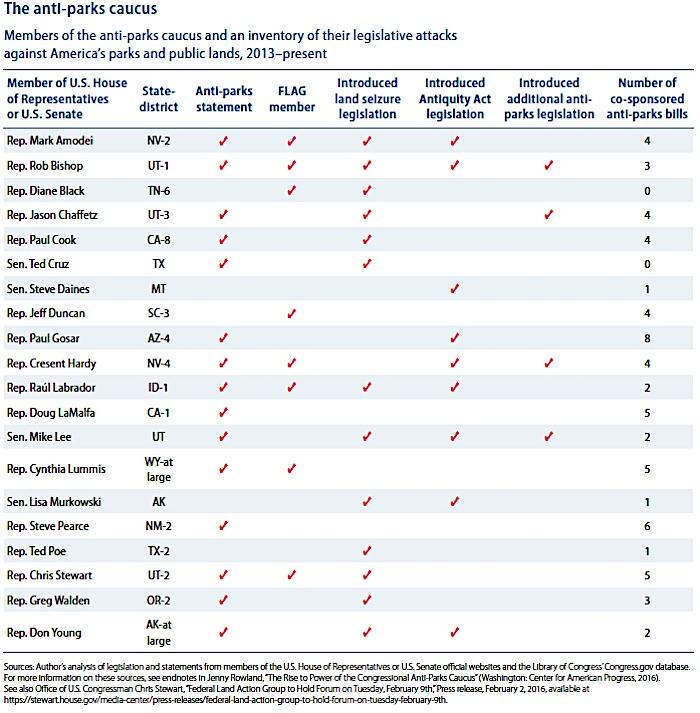A key group of 20 members of Congress is responsible for marshaling legislation aimed at shrinking the federal landscape and attempting to block the president's authority to establish national monuments under the Antiquities Act, according to a left-leaning public policy think tank.
In a paper (attached below) released Monday morning, the Center for American Progress said the 20 politicians run counter to public opinion polls that show a vast majority of Americans value the country's public lands. Their philosophy when it comes to opposing federal ownership of lands can be traced to one of three attributes, the Center maintained: they are members of the Tea Party; they recently were challenged by a Tea Party candidate in a primary election, or; they come from congressional districts in which they face little competition.
"By launching an ideological attack on the government's authority to protect and preserve lands, waters, and wildlife, the anti-parks caucus is proving to conservative primary voters that it is opposed to the federal government in every way," the paper stated.
According to the paper, The Rise to Power of the Congressional Anti-Park Caucus, "between January 2013 and March 2016 members of Congress filed at least 44 bills or amendments that attempted to remove or undercut protections for parks and public lands, making the 114th Congress the most anti-conservation Congress in recent history."
(Traveler footnote: While the paper's title calls the politicians the "Anti-Park Caucus," most of the legislation cited by the group involves U.S. Bureau of Land Management and U.S. Forest Service lands, not those managed by the National Park Service.)

One of the 20 identified by the group is U.S. Rep. Rob Bishop, a Utah Republican who chairs the House Natural Resources Committee and is a founding member of FLAG -- the Federal Lands Action Group, which the Center said "has stated its goal is to 'develop a legislative framework for transferring public lands to local ownership and control.'"
Interestingly, according to an article earlier this year in The Atlantic, "Yes, the government owns nearly a third of America. But after mapping federal holdings to county populations, it becomes clear the majority of government land is remote and unpopulated, far from even most rural residents."
To buttress its position that the 20 are going in a direction contrary to public opinion, the Center for American Progress cited a poll from January in which 77 percent of those surveyed in Arizona, Colorado, Idaho, Montana, New Mexico, Utah and Wyoming were of the opinion that the country benefits either a "great deal" or a "fair amount" from national parks, and 55 percent said they personally benefited either a "great deal" or a "fair amount" from national parks.
Nearly half of those surveyed were of the opinion that the federal government wasn't doing enough to protect or strengthen the National Park System. Additionally, when asked how they would view an elected representative who took a strong stand on national park lands, 83 percent said they would view them favorably. Broken down by political affiliation, 88 percent of those bullish on national parks identified themselves as Democrats to the pollsters, and 79 percent as Republicans. Eighty-nine percent had visited a national park within the last year, according to the survey.
While the Center for American Progress identified the reasons it believed were behind the anti-public lands stance of the 20 politicians, it did not have a solution for how to move them back to bipartisan support of public lands.
"The report doesn't necessarily go into types of solutions to this. I think that's kind of a next step," said Jenny Rowland, the paper's author. "We looked into the issues of gridlock and this kind of far-right pandering that drives these congressmen further right than towards the center where this has historically been an area of bipartisanship, public lands and things like (the Land and Water Conservation Fund)."
The group also didn't explore whether campaign contributions were driving the politicians' positions on public lands.



Comments
What's the double standard? Lyman was excercising his rights under RS 2477. The hikers were trespassing. Their treatment sounds a bit harsh but I suspec there may be more to the story.
OHillary! Dear Hillary!
Your fearful trip is done!
Your ship has weathered the FBI!
The prize you seek can now be won!
You'll be queen of the realm, including our parks,
which you promise to ring with solar!
Your port is near, the bells I hear!
Even your first mate is staying sober!
O Hillary! Dear Hillary!
Rise up and hear the bells!
The women love you, Senator Warren adores you!
You're no Lincoln, but yes, hear the bells!
Blame the Republicans again, and come November,
California will put you o're the top!
O Hillary! Dear Hillary!
The glass ceiling is within your shattering!
It's just that the parks, Dear Hillary, yes, the national parks,
Are as likely to get another battering.
I think Congressman, Paul Cook (R-CA) is getting a bad rap being lumped into a nefarious group including Reps. Rob Bishop and Don Young. i consider Cook to be supportive of National Parks, but skeptical of Park expansion into areas with competing interests. Cook has also taken heat for his opposition to Presidential proclamations of new National Monuments in the California Desert. These include areas managed mostly by the BLM and Forest Service. This may be the source of at least part of Cook's citation for "Anti-Park's Statement".
Still another chapter from Southeastern Utah's bin of lunacy: http://www.sltrib.com/news/4072354-155/rolly-open-season-on-backpackers-in
And: http://www.sltrib.com/home/4083401-155/are-utah-taxpayers-footing-bill-for
Thank goodness there are still a few newspapers that will dig for facts.
Here is a copy of an email received at the Utah Capitol recently: http://www.sltrib.com/opinion/4088249-155/bagley-cartoon-land-grab-grift